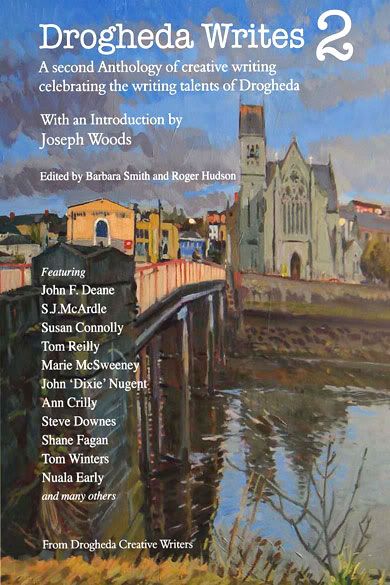Drogheda Writes 2 : The Editor's Tale
My writers group, Deansgrange Writers, are currently preparing our first anthology for publication this November (working title : Crossroads) with our editor Katie Donovan. Earlier this year, Drogheda Creative Writers launched their second anthology, entitled Drogheda Writes 2, edited by writer, tutor and fellow blogger Barbara Smith. In the interests of research and general curiousity, I asked Barbara to tell me a little about the process she went through in preparing the anthology and she kindly obliged. The result is a very interesting insight into what's involved in getting a project like this off the ground.
Drogheda Writes 2 is (logically enough) the second anthology from Drogheda Creative Writers - can you give us some background to the group?
Drogheda Creative Writers group has existed for about twenty odd years now in one form or another. In the past, various compilations took place as photocopied pamphlets, but the anthologies have come through a combination of good organisation from their leadership and steady sponsorship from the local arts office and local businesses. The group itself ranges from those who just write for themselves, to writers who are quite successful in their own right and are established nationally as well as locally.
How did the decision to publish a second anthology come about?
Basically, because the funds were there, and to help keep interest in the group growing.
At what point did you become involved in the project?
I was asked to come in as editor, after the commitee had decided to go ahead with a second anthology.
How was the work chosen - did the writers submit a broad selection, to be narrowed down by the editor?
Members were asked to submit four to six poems each, or two to three stories each: a sort of 'select your best work', request.
Were there any disagreements over the work selected?
Not really: sometimes there were better pieces out there, that I didn't know about, (basically because I live in Dundalk and don't get to the meetings or know the members as well as the leadership does) and was guided towards.
Was there any over-arching theme that the writers responded to?
Death seemed to feature quite a bit, but that's not surprising: it's a subject that consumes most writers at some stage or another.
Briefly, what did the editorial process consist of?
Depending on the writers involved it ranged from having to completely sub-edit, to smaller mistakes like punctuation. Generally though, I went with what I liked and what I felt represented best the writer in question. There were some real gems that turned up and overall it was a pleasure to read the submissions.
Who designed the cover - how was that lovely painting chosen?
Richard Moore, the Drogheda based artist, had painted a picture for the previous anthology, so it seemed natural to ask him again. The cover designer was graphic artist John Moloney - again he did the last cover, so it seemed natural to ask him again. Apparently John actually saw Richard painting the picture by the Boyne river on a cold February day and asked him if we could use the picture as the cover.
Who laid out and typeset the book?
Ah, that would be me as well :)
A women of many skills! Were there any technical issues in preparing the book for print?
Oh yes. Basically, Microsoft Word is very unwieldy for this process (especially when you have the headers all sorted out and then have to make changes... grr) but I was sort of stuck with it. Mind you, I got it to work out in the end. There are probably far better programmes you could use, but at the end of the day you supply the format as a .pdf for the printer - and Word does allow you to do that, so it doesn't really matter.
How did liaising with the printers work out?
No problems with ColourBooks Ltd. at all. Lovely people, very professional. They do Poetry Ireland Review, you know... and The SHOp...
Did you get an ISBN number? How?
That was already there, my co-editor Roger Hudson had one extant from before. I'm not sure how you go about getting them, but I've been told it's not that complicated. But it's one of the first things you should organise before you get started asking for submissions. Probably.
How was the book funded - were there any grants or sponsorship involved?
Local government sponsorship and local businesses.
How was the proof-reading handled - did one person do it, or was the task shared among the writers?
Me, and three other readers. The last proof was done by a gentleman who works for O'Brien Press and also happens to be a member of this group, which was very handy as he put me straight on some style matters, like ellipses and quotation marks.
How was the book sold? Was each writer given a number to sell?
Two words: book launch. That's where you shift the majority of stock, so you need to allow, say, five books per contributor. They will receive one free copy, but they tend to buy copies for their friends/families, if the families/friends don't actually buy it themselves. We were lucky to get a foreword from Joe Woods of Poetry Ireland, as he is a Drogheda native, and he also co-launched the book with Drogheda's Mayor. Drogheda Writes 2 is also stocked in bookshops in Drogheda, like the High Lanes gallery and Boyne Books, as well as Easons and/or Waterstones.
Did you distribute to local / national retail?
It would be much harder to sell on a national level: local anthologies tend to do best at the launch and perhaps around the Christmas time in the first year. People buy it as a present for family and friends. I think we printed 500 copies and sold it for €12.00 to the general public and €10.00 as a discount to members, once they'd received their contributor copy.
It's now four months since the launch - how has the book been selling?
It's been selling very well, considering the current financial climate.
I believe this was your first editing job - what were the ups and downs?
The up was definitely the launch night: seeing contributors reading from the anthology and them being delighted with the end result. The down side was that the process was all consuming. Basically for four months, I ate, breathed and slept the anthology. I also wished I had a little more time for the overall process, but I belive all editors probably think that in the end. I enjoyed it quite a lot more than I thought I would, but I am glad it's done now.
What did you learn from the process?
A great deal about the planning that goes into the process and what is entailed in producing an anthology like this. There's a whole pile of stuff I would do differently if I had to do it again, but I don't think I'll do it again any time soon. I'm too busy teaching these days.
Any tips for other groups who may be planning a similar project?
Plan everything in detail. Deadline every stage. Stick to the deadlines. Communicate with your fellow editors/helpers/organisers as much as you can. Allow yourself a little 'oops' time as well. Believe it will work. Oh yes, and enjoy the launch!
Thanks so much for taking time for this Barbara. I'm sure your answers will be useful to other groups considering getting their work into print.
Poem on the 2-1 Loss to the USA by the Canadian Men's Hockey Team In The
Gold Medal Game at the 2026 Winter Olympics
-
*On The Game*
For a moment, while they played,
my father was alive again,
roaring at the TV -
come on! come on! -
and then, that overtime brutality -
a mil...
1 week ago

